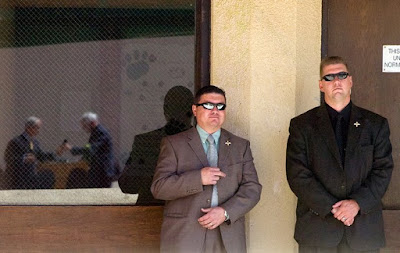 That’s right, this man thinks I’m still number one.
That’s right, this man thinks I’m still number one.“All the world is a stage,” wrote William Shakespeare, in “As You Like It,” in Act 2 scene 7.
As a journalist, there is a working theory that you are not supposed to become part of the news.
Journalists often times will duck out of a scene when they realize that they might be included in a camera’s view.
I must have slept through that lecture in Writing for Mass Media I, where the ground rules might have been outlined, because I chase the image. I don’t care if other journalists are in my pictures. Part of what I do, is place subjects in their context and to show who is covering the event. It’s also why I photograph the entourage traveling with politicians, including their security.
It’s especially true for politicians and at political events large or small.
So what’s wrong with this picture?
Act One:
Monday May 18, 2009
I attended a media event announced by Mayor Martin J. Chávez’ Chief Public Information Officer Deborah James who provided this release:
May 15, 2009Contact: Deborah James 379-2844
MEDIA ADVISORY
WHAT: Mayor Martin J. Chávez Joins APS Superintendent Winston Brooks to Discuss Upcoming Dropout Summit
WHERE: Albuquerque High School - 800 Odelia NE – Patio Area
WHEN: Monday, May 18, 2008 @ 11:00 a.m.
I called my client Ched MacQuigg Diogenes' six, whose posts feature ethical questions at Albuquerque Public Schools, City and State governments, asking if he wished to also attend. He did.
Upon arriving at Albuquerque High School, we sought out the administration offices to sign in, but were greeted by Principal Tim McCorkle in front of his office. He took a look at my three cameras and photo vest, welcomed us and directed us to the doors to the patio, between an APS police officer and security aide.
Mayor Chávez and Superintendent Winston Brooks each arrived with a several member entourage.
Chávez was accompanied by: Communications Officer James, two Albuquerque Police Department's Mayoral Protection Detail Detectives, and Mayor's Education Coordinator Paul Broome, who was already present.
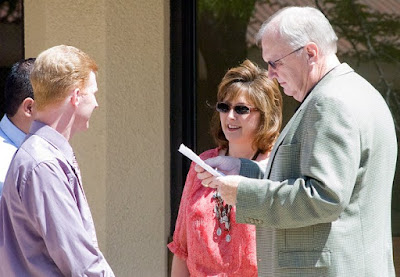 Brooks, right, was accompanied by: Community Relations Office Executive Director Monica Armenta, center, and Communications Specialist John Miller, left.
Brooks, right, was accompanied by: Community Relations Office Executive Director Monica Armenta, center, and Communications Specialist John Miller, left.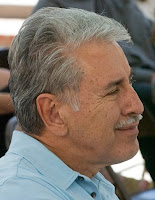 Newly elected APS Board Member Lorenzo Garcia, left was present.
Newly elected APS Board Member Lorenzo Garcia, left was present.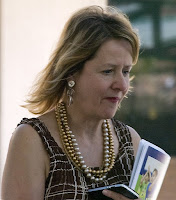 James, right, was handing out Chávez’ talking points. I had to ask her for a copy. She apologized saying she had given a copy to my friend and thought we were together. I told her that we worked together and separately. She was her normally pleasant and polite self.
James, right, was handing out Chávez’ talking points. I had to ask her for a copy. She apologized saying she had given a copy to my friend and thought we were together. I told her that we worked together and separately. She was her normally pleasant and polite self.Chávez, Brooks and Broome made their presentation.
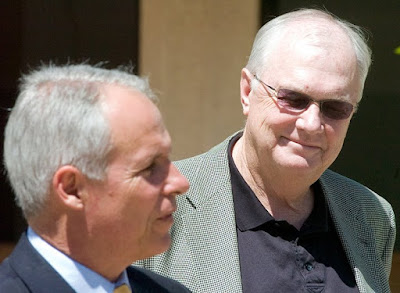 Chávez’ big announcement was a restatement about the upcoming “Dropout Summit,” May 29 and 30.
Chávez’ big announcement was a restatement about the upcoming “Dropout Summit,” May 29 and 30.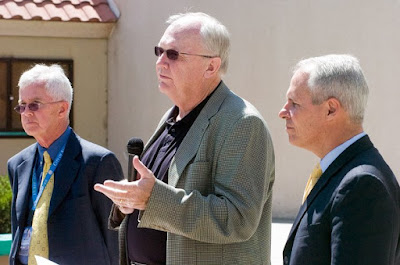 Brooks’ major point is extending normal high school hours into the evening to help accommodate students at risk of dropping out.
Brooks’ major point is extending normal high school hours into the evening to help accommodate students at risk of dropping out. At the end of the statements, Chávez asked if there were any questions. MacQuigg, below right, raised his hand. Chávez asked if he was, “media?”
At the end of the statements, Chávez asked if there were any questions. MacQuigg, below right, raised his hand. Chávez asked if he was, “media?”MacQuigg said yes and Chávez recognized him.
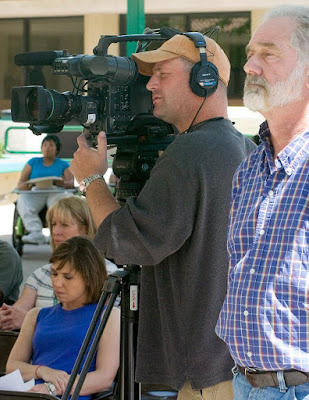 MacQuigg’s question was:
MacQuigg’s question was:“The chief reason that kids don’t come to school is because they don’t want to. There are kids that will never fit the NCLB mold. And I’m wondering if there is anyway for us to offer a curriculum that is not driven by NCLB that provides for their needs? Is there anyway we can do it?”
“Absolutely,” Chávez said. “No, what we’re going to do with this summit, in all seriousness is we’re going to listen to the kids. And then we’re going to then combine the kids with the adults, heavily concentrated with the professionals in education. And then go through the process of dialogue. Then we’ll submit the report to APS. Whether APS decides it’s in the best interest of the student population to amend models. It will be totally an APS driven decision and its one I’ll stand behind,” Chávez said.
Chávez may have had some doubt about MacQuigg being a journalist as he said, “Let’s take the media questions right now, then I’ll be happy to stick around and speak to anybody that wants to talk." It's not his first time disregarding a particular medium, bloggers.
On his site, MacQuigg makes a big deal about how adults should role model the Pillars of Character Counts, here is his take of events.
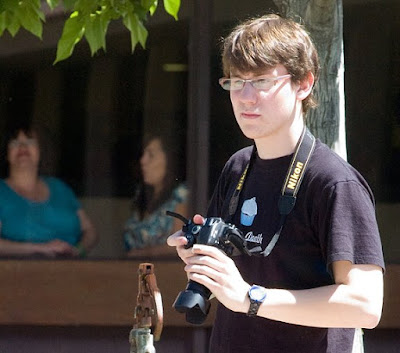 This young man was apparently an AHS student photojournalist covering the event. His presence reminded me of how I began covering news In Albuquerque. It was a bit discouraging to have him see the law twisted to crush the press. I had hoped for him to see how he could move without interfering; how journalism can be fun and rewarding.
This young man was apparently an AHS student photojournalist covering the event. His presence reminded me of how I began covering news In Albuquerque. It was a bit discouraging to have him see the law twisted to crush the press. I had hoped for him to see how he could move without interfering; how journalism can be fun and rewarding.Associated Press Writer Heather Clark asked Brooks about the extended school hours.
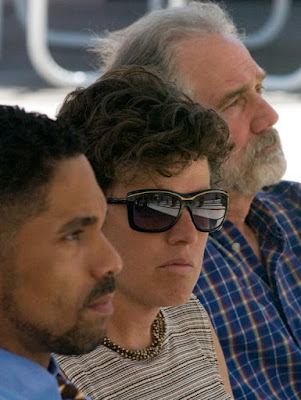 Albuquerque Journal Staff Writer Andrea Schoellkopf and MacQuigg sat in the front row in front of the KOAT TV crew.
Albuquerque Journal Staff Writer Andrea Schoellkopf and MacQuigg sat in the front row in front of the KOAT TV crew.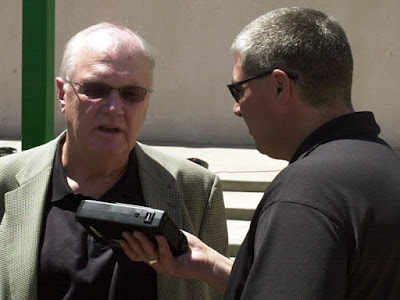 Other members of the media, like 770KKOB reporter Craig Kennedy who talked with Brooks, waited until they could have one-on-one on camera or audio-recorded interviews. Standard stuff; in the competitive news world, asking a question in the open allows anyone to use the answer. So, if a journalist knows they can get a one-on-one interview they will hold their particular question to get the exclusive answer. It’s pretty silly, but in the dog-eat-dog world of what passes for news these days; that’s the way the game is played.
Other members of the media, like 770KKOB reporter Craig Kennedy who talked with Brooks, waited until they could have one-on-one on camera or audio-recorded interviews. Standard stuff; in the competitive news world, asking a question in the open allows anyone to use the answer. So, if a journalist knows they can get a one-on-one interview they will hold their particular question to get the exclusive answer. It’s pretty silly, but in the dog-eat-dog world of what passes for news these days; that’s the way the game is played. MacQuigg spoke with Board Member Garcia who then sat with a group of students and was listening to them intently as they spoke in Spanish.
MacQuigg spoke with Board Member Garcia who then sat with a group of students and was listening to them intently as they spoke in Spanish.Chávez talked to people then left accompanied by Albuquerque High School Director of Student Activities Gabriel Antonio Gonzales.
A couple of minutes later I noticed a rush of a couple of APS police and at least two security aides come onto the patio. They made a direct path to where we were standing.
I hadn’t been on the other side of overwhelming force in decades and had forgotten what it looked like from the other side.
“You have to leave. You aren’t the press. You don’t have credentials,” APS Police Officer Paul Schaefer said in rapid succession as he took the contact role. “I was told you’re not part of the press club.”
“You’re wrong,” I said.
 I looked at a pocket in my photo vest that has a clear plastic front. It’s designed to keep credentials visible yet out of the way. Print journalists often wear credentials on a lanyard around their neck. However, still photographers prefer not to wear lanyards as they interfere with neck straps; so the pocket is convenient. I had the pass issued by the Secret Service last week for the Presidential visit to Rio Rancho visible.
I looked at a pocket in my photo vest that has a clear plastic front. It’s designed to keep credentials visible yet out of the way. Print journalists often wear credentials on a lanyard around their neck. However, still photographers prefer not to wear lanyards as they interfere with neck straps; so the pocket is convenient. I had the pass issued by the Secret Service last week for the Presidential visit to Rio Rancho visible.“White House Press Pool,” I asked Schaefer, showing him the pass?
“Never heard of it,” Schaefer said.
“Ever heard of the President of the United States?”
"Vaguely,” Schaefer said.
“How about the First Amendment,” I asked?
"I’ve heard of the First Amendment,” Schaefer said.
“As a matter of fact, when I…” I said, as I dug deeper for my own credentials, which list former and current clients and my own sites; there was also an old State Senate Press pass.
"but I’ve been told this isn’t a public event,” Schaefer said.
“Well it is a public event when you have the Mayor of the City of Albuquerque present,” I said.
“I was asked by one of the administrators…,” Schaefer said. “Don’t, please don’t.” MacQuigg had raised his cellular phone camera and taken Schaefer’s picture.
“Don’t. Don’t. Don’t,” Schaefer asked. “I’m just the messenger, OK?"
“When I walked into here, I was greeted by your principal,” I said.
“OK,” Schaefer said.
“Alright, he pointed me to where this event is…” I said.
“I don’t want my picture taken sir,” said Schaefer, as his attention shifted to MacQuigg.
“It doesn’t matter,” I said.
“Yes it does,” Schaefer said.
Things got a bit chaotic for a moment as one of the aides started demanding that, “you have to leave.”
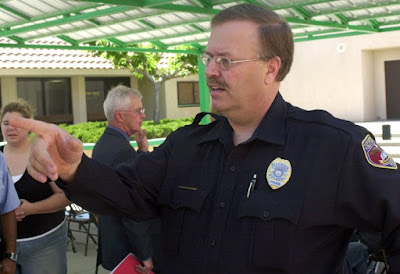 As Schaefer focused on MacQuigg, I took a step back, raised my camera and took photographs of the officer.
As Schaefer focused on MacQuigg, I took a step back, raised my camera and took photographs of the officer.A woman, who might have been a teacher or an administrator rushed toward me saying, “He asked you not to take his picture.”
“He’s a public official; he gets his picture taken,” I told her.
We were then told to go the office and sign in.
I knew what was about to transpire would be an exercise in the educational failures of the public schools and the police academy’s basic civics lessons and constitutional law courses.
One of the female aides insisted that it was an APS event and would not listen to, understand, or acknowledge that the City of Albuquerque notified the media of the press conference.
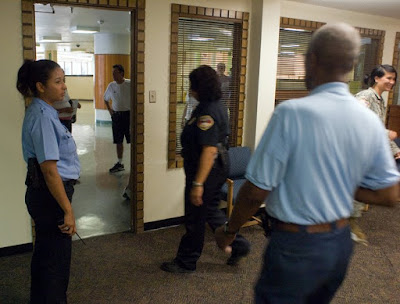 We were escorted to the administration offices and Gonzales was called for over the walkie-talkies several times, but he never showed up.
We were escorted to the administration offices and Gonzales was called for over the walkie-talkies several times, but he never showed up.After several minutes of waiting for Gonzalez, Principal McCorkle arrived and Officer Schaefer started to explain what had transpired when Armenta came in asking what the problem was.
Schaefer said that we hadn’t signed in. I told her that we were being ejected because someone had challenged our status as the media. She asked, whom we were, knowing full well who we are. She called MacQuigg, Mr. MacQuigg.
I first met Monica Armenta in about 1984, when she was a University of New Mexico Journalism student interning at KOB. I was a Field Investigator and was on patrol driving east on Gold at 5th Street when I passed the old Federal Courthouse on the northeast corner. I didn’t actually recognize anything, but was compelled to circle the block. When I returned to the intersection I saw that a front first floor office was fully engulfed in flames. I called for the Fire Department, which arrived in a few minutes and quickly knocked down the fire. A few minutes later Armenta arrived with a cameraman.Armenta challenged my credentials when I explained that I was a freelancer. I gave her my business card and showed her my credentials. She said she would have to check to see if freelancers were allowed. She returned my card. I was struck by the statement that she would have to check; with whom? Armenta is Community Relations Office Executive Director; she would be the one who makes such a determination.
Her qualifications as a field reporter were as much a part of her outgoing ways, as was her ability to: read a script, to properly enunciate difficult names and places. We spoke and I learned that this was one of her first story assignments she covered without a senior reporter shadowing her.
She did an on camera interview with me on the par of a murder investigation. The cameraman turned off the light and turned away when he was satisfied that he had 10 seconds of usable film for a sound bite.
MacQuigg asked her if she understood what the media was?
She replied that she had worked 25-years for KOB. After a short stint as a reporter, Armenta gravitated to an anchor position and became a newsreader. Her corporate background seemed to be influencing her concept of who are members of the media. She doesn’t know from freelancing.
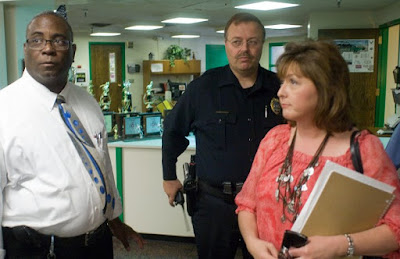 I asked Principal McCorkle, left, if he hadn’t greeted us and directed us to the patio. He said he had, just like everybody else who came to the event. He then said maybe that was a mistake.
I asked Principal McCorkle, left, if he hadn’t greeted us and directed us to the patio. He said he had, just like everybody else who came to the event. He then said maybe that was a mistake.The APS policy on School Police Authority reads in part:
Visitors must comply with the rules of the school.
An individual failing to comply with any of these procedures and/or causing a disruption of the educational process may be barred or removed from the campus at the principal's discretion.
 One would think that once the principal explained himself it should have been the end of it. Armenta disappeared and Schaefer backed away. However, it wasn’t over, APS Security Aide Angelique McGee didn’t understand what the principal said. The event was done, we were ready to leave, but she insisted on driving us like cattle from the campus.
One would think that once the principal explained himself it should have been the end of it. Armenta disappeared and Schaefer backed away. However, it wasn’t over, APS Security Aide Angelique McGee didn’t understand what the principal said. The event was done, we were ready to leave, but she insisted on driving us like cattle from the campus.MacQuigg wrote an e-mail to Armenta asking what credentials would satisfy her.
She responded, writing that the state police issue credentials.
From the most recent New Mexico State Police Media Guide, here is their definition:
Media CredentialsArmenta does not recognize or understand the history of local government issued media credentials. In the early 1970’s governments realized that the First Amendment’s first five words, “Congress shall make no law…” meant that not only was congress prohibited from making any law, but by the 14th Amendment, all states and their political subdivisions were prohibited from making any statute, ordinance or rule, “…abridging the freedom of speech, or of the press…”.
News outlets are encouraged to provide media credentials for their staff members covering incidents or events involving the State Police. Media credentials may be requested for access to an incident scene. During your on-scene investigation your cooperation is appreciated, in consideration of the many tasks and responsibilities placed on our personnel at the scene of an incident.
The Constitution’s “We the People…” is a limit on government and the Bill of Rights was added to assure additional protections. The media need not be a corporate venture to be “the press.” Journalists are those who keep journals, correspondents are those who send correspondence and the media are those who publish or broadcast to other people.
Through my reporting I was able to confirm Activities Director Gonzales told APS Officer Schaefer that MacQuigg and I were not media.
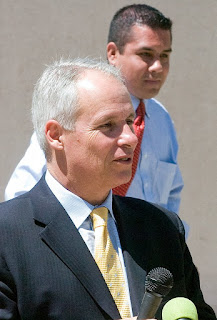 Gonzales, behind the mayor, had left the press conference with the Chávez entourage. Because Gonzales doesn’t know MacQuigg or me and the mayor and several members of his camp do know me, I am sure one of them told Gonzales that we were not media; I just don’t know which one.
Gonzales, behind the mayor, had left the press conference with the Chávez entourage. Because Gonzales doesn’t know MacQuigg or me and the mayor and several members of his camp do know me, I am sure one of them told Gonzales that we were not media; I just don’t know which one.Apparently I am not going to find out. People who are in a position to know or find out have been ordered to not talk, and to refer all questions to Armenta, whom I was told was preparing a response and would contact me. It might be difficult for her because she had no interest in communicating earlier and punctuated the point by returning my business card.
A call to James seeking information and comment, late Friday afternoon went unreturned.
In a short telephone interview, Gonzales, whose responsibilities according to his biography on the AHS Webpage includes Public Information, would not talk about his interaction with the Mayor’s staff that led him to tell APS Police that MacQuigg and I were not media.
“I want to refer you to the Communications Department – Monica Armenta, for comment."
I pointed out to Gonzales that, “Armenta can’t answer the question; only you can. It was you who talked with the mayor’s staff.”
“I’m referring you to Monica Armenta, or the mayor’s staff,” Gonzales said.
When I asked if he wasn’t in charge of public information at Albuquerque High School, he replied:
“I know that you appreciate the dignity of a person to hold a position. Have a good day. Good bye.” He hung up.

Act Two:
Thursday May 21, 2009
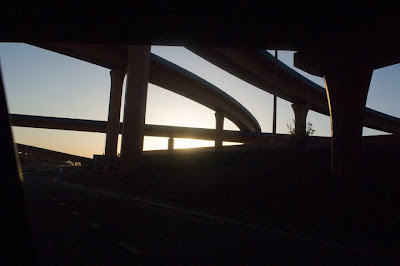 In another media advisory James announced that the mayor would be lighting a new display in the Big-I. It is the finishing touch on the long delayed landscaping project.
In another media advisory James announced that the mayor would be lighting a new display in the Big-I. It is the finishing touch on the long delayed landscaping project.The event was scheduled for the westbound frontage road, west of the northbound frontage road, just past the I-25 fly-over. I arrived along with at least two television stations; KOAT and KRQE. James acknowledged me and pointed me in the direction of the event.
As I got closer, Albuquerque Police Department's Mayoral Protection Detail Sergeant Louie Sanchez was standing at the foot of a gravel path. He asked me to wait a minute until the mayor arrived.
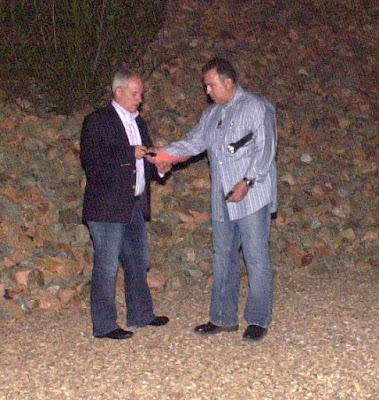 Chávez arrived, paused to talk to Sanchez then went over the hill.
Chávez arrived, paused to talk to Sanchez then went over the hill.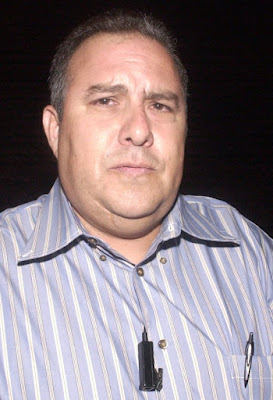 I asked if Sanchez was keeping me from going to the event and he wouldn’t answer directly. I asked him what he would do if I walked past him. He said he would issue me a “lawful order” to stop.
I asked if Sanchez was keeping me from going to the event and he wouldn’t answer directly. I asked him what he would do if I walked past him. He said he would issue me a “lawful order” to stop.I asked him what would be the underlying charge; what crime would I be committing? He answered he was protecting the mayor from me. Sanchez said that Chávez was afraid of me, that I had assaulted him by pointing a camera with a big lens on it and that I had bumped the mayor.
I told Sanchez that I had touched Chávez only one time; actually he had touched me when he shook my hand the first time we met. I said Chávez’ did not fear me physically, but feared my photographs that have immense political power to show him as he is.
During the Mayoral campaign, candidate Martin Chávez approached the City Employee Labor Coalition on June 30, 1994, and asked for their support. He made several promises; that he would unilaterally return the take home cars to police officers (he would later back off that statement and say he would look at the financial aspect of returning the cars). Prior to asking for the endorsement of City unions’ Presidents, Chávez acknowledged that he recognized that Director of Employee Relations Bob Brown was an impediment to good relationships between the Mayor and City Employees. Chávez promised that on "day two" of his administration, Bob Brown would no longer be Director of Employee Relations. Upon being elected, Chávez reappointed Brown within a couple of months.
There was an irony that escaped Chávez, though some of the union leaders who were representing groups that were negotiating with the City had made disparaging comments about Brown publicly, it was in the context of the process and done in their respective roles. The reality was that Brown was neither the best or worse Director of Employee Relations. He had originally come from labor and he was appointed director after several years of playing a secondary role in Employee Relations. None of the leaders were seeking his removal and in comparison, one could talk with him.
I spoke with Sanchez about which possible crimes he was referring. He said assault. I asked him, what element of the crime of assault was missing? He asked me to define assault. It’s extremely disheartening to learn that veteran officer, six years a sergeant does not know the element of the most basic of crimes; the starting point of every violent crime on the books. Assault is the threat or fear of an immediate battery. A battery is the unlawful touching of another, done in a rude or insolent manner.
Albuquerque Code of Ordinances Chapter 12: Criminal Code
Article 2: Offenses Relating to Public Order and Safety
Section:
§ 12-2-1 ASSAULT.Sanchez said that my pointing a camera with a large lens on it was an assault. That he had seen me point my zoom lens at Chávez. Photography is not a crime, it is not a touching or an attempted touching. If Chávez is afraid of me, it’s not the front of the camera that should bother him; he should fear what comes out the back, accurate depictions of him.
Assault consists of either:
(A) An attempt to commit a battery upon the person of another; or
(B) Any unlawful act, threat, or menacing conduct which causes another person to reasonably believe that he is in danger of receiving an immediate battery; or
(C) The use of fighting words which by their very utterance are likely to cause an average addressee to fight.
§ 12-2-2 BATTERY.
Battery is the unlawful, intentional touching or application of force to the person of another when done in a rude, insolent or angry manner.
I asked Sanchez if there were any police reports of these alleged assaults and the battery. He said no. I asked if there was ever a restraining order. Again no. I told him he had no reason to believe that I had committed a crime or was about to and did he know he was engaging in a form of censorship, prior restraint by denying access.
There is no probable cause to arrest me. There is just raw abuse of power to keep me from doing my job; photographing and reporting on the mayor. There is no “lawful order” Sanchez can issue.
Sanchez asked me if I knew what qualified immunity was. I said I did. Qualified immunity is the theory that a citizen may not sue the King without his permission. It applies to government and their agents in certain situations.
He said he’d talked to “the lawyers” who advised him he had qualified immunity. I asked him the name of the lawyer, but he wouldn’t answer.
What Sanchez was alluding to was that he could violate my rights and keep me from covering the mayor. He was suggesting that he could get away with violating civil rights and I would not be able to get him into court. Qualified immunity might be applied in State District Court.
What Sanchez doesn’t seem to realize is that an imposition on the free press is in the jurisdiction of the Federal District court, which would not recognize his qualified immunity.
However, what Sanchez had been told was to assure him that should he violate anyone’s rights, the City would fully defend him and for him to do what he thought he needed to do whether legal or not. I’ve heard it before.
Lawyers who gave Sanchez such advise are fundamentally corrupt because they ignore the Constitution.
I invited Sanchez to gather up all the information on all the events where the mayor thinks he was assaulted write up an affidavit for an arrest warrant and let’s go test it in court. I’ll bring all my pictures from each event and let a jury decide. I would welcome the opportunity to cross-examine Chávez. A restraining order could also be tested in court and Chávez could be made to testify to the allegations used to apply for such an order.
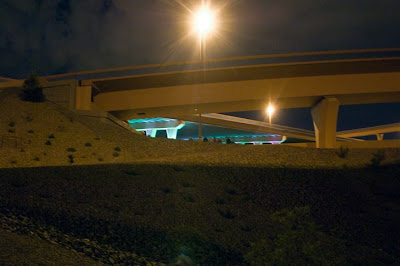 I had to photograph the lighting event from an unacceptable distance.
I had to photograph the lighting event from an unacceptable distance.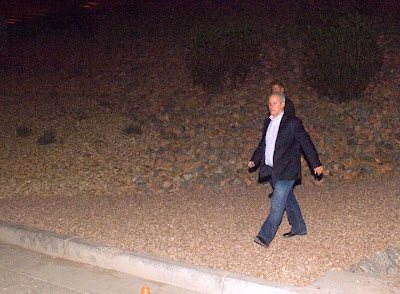 As Chávez returned to the highway with his officer-driver, Sanchez went to move an orange barrel.
As Chávez returned to the highway with his officer-driver, Sanchez went to move an orange barrel.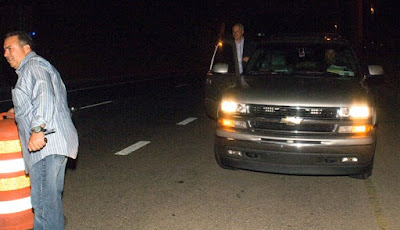 Chávez stood in the open door of his SUV and yelled at Sanchez about me, “Didn’t he use to be a police officer? Finished his career the way he started it…”, a car went by and muffled what he said next. When I could hear him again Chávez was laughing.
Chávez stood in the open door of his SUV and yelled at Sanchez about me, “Didn’t he use to be a police officer? Finished his career the way he started it…”, a car went by and muffled what he said next. When I could hear him again Chávez was laughing. Act Three: Actually a differed prologue.
Act Three: Actually a differed prologue.A couple of weeks ago I had lunch with the mayor. Ok, I had lunch in the same room at the Standard Diner, not the same table.
Chávez was with a group that included former Governor Toney Anaya who is coordinating the Federal stimulus money coming to New Mexico. I was with a number of journalistic colleagues. When I arrived the owner noticed my camera and said please don’t harass the mayor. It seems one of my group was recognized and when told the mayor was present, had joked that he got in the mayor’s face regularly. So, the owner was concerned and our independent joking was not appreciated. I noticed the two officers that would be at AHS sitting a couple of booths from us and across the room from the politicos. Holmes passed our table and one of my buddies told me that he had given me a hard stare. I had not seen it because I had my back to him.
At one point, Chávez got up and walked towards our table having spotted the broadcaster, but turned away, walking around another table when he saw me. My friends noticed and told me they thought it weird.

My Take
The man making the obscene gesture at the top of this post is Albuquerque Police Department's Mayor’s Protection Detail Detective Aaron Holmes. You’ve met him before when he threw me out of a news conference a year ago. See that post here.
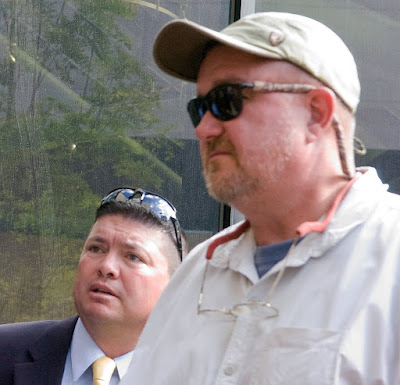 Holmes, above left, was in the crowd of guests and press waiting to attend Democratic Party presidential candidate Barack Obama's visit to the main public library.
Holmes, above left, was in the crowd of guests and press waiting to attend Democratic Party presidential candidate Barack Obama's visit to the main public library.It’s not the first time someone from the Mayor’s Protection Detail has flipped me off. I initially took it as a sign of endearment. I immediately thought that it was as uncool as it was, I would simply send the picture to Chief Ray Schultz and tell him, you deal with this before I deal with this.
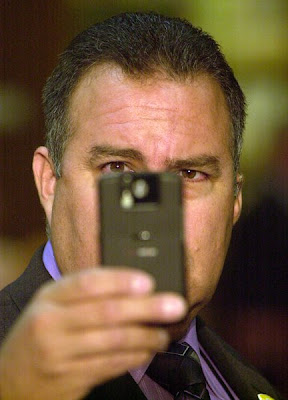 It wasn’t the first time someone from this detail had indicated that I was number one. Sgt. Sanchez and I have taken each others pictures in what I considered a fun exchange. It might have been taken for the detail’s intelligence file, to show temporarily assigned officers who Bralley is.
It wasn’t the first time someone from this detail had indicated that I was number one. Sgt. Sanchez and I have taken each others pictures in what I considered a fun exchange. It might have been taken for the detail’s intelligence file, to show temporarily assigned officers who Bralley is.As a former police union president and representative at many officers’ disciplinary actions, I am loath to file a complaint against a brother officer. However, just like when I was on the job, there is a line that I would not allow any officer to cross. The action went beyond the pale when APS responded to throw MacQuigg and me off campus by Officer Schaefer. Schaefer said an administrator, later identified as Gonzales, soft confirmed he learned from the mayor’s entourage that, “we were not the media.”
Whether Holms or his unidentified partner made the comment or whether it was Chávez or James who told Gonzales, both officers have a duty and an obligation to uphold the constitutional rights of journalists, any and all journalists, whether a politician considers their reporting as good, bad, fair or unfair.
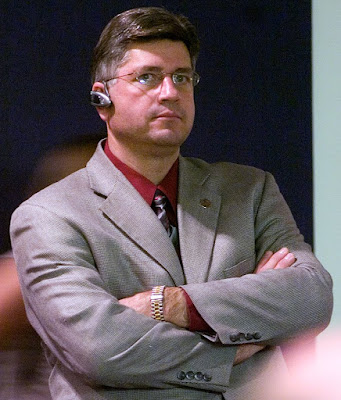 I sent Albuquerque Police Department's Public Information Officer John Walsh, above, an attached photo of the second officer, requesting his identity. I contacted him by phone a couple of days later. Walsh had not checked his e-mail in the preceding days. He said he would attempt to identify the officer and would get back in touch. Consistent with his past practices, Walsh did not get back to me.
I sent Albuquerque Police Department's Public Information Officer John Walsh, above, an attached photo of the second officer, requesting his identity. I contacted him by phone a couple of days later. Walsh had not checked his e-mail in the preceding days. He said he would attempt to identify the officer and would get back in touch. Consistent with his past practices, Walsh did not get back to me.It’s been 35 years since I provided personal security when I worked as a courtroom security deputy for Prince George’s Maryland’s Sheriff’s Department. However, one thing that I learned and would later teach had to do with remaining emotionally detached from your law enforcement duties. Loyalty must be to the principle over ideologue over personality. The force of Chávez’ personality has subsumed the mayor’s protection detail and the officers are trying to protect him from politics rather than physical threat. Thirty-five years may sound like a long time, but human nature has changed very little over the millennia.
Ambivalence is a crucial part of the protection effort. When an officer’s sense of loyalty is compromised and they are willing to indulge the political paranoia of the protected individual, their ability to remain objective is a crack in the invisible cloak and can become a distraction that might be capitalized upon by real physical threats.
It’s past time for the chief to make a wholesale housecleaning of the Mayoral Protection Detail Detectives.

As for the distance factor with the mayor, different people have different comfort zones. Chávez’ claim that he is uncomfortable with me must have to do with it being me as he will stand close to and often surrounds himself with political allies and subordinates at many of his staged photo opportunities. He clearly doesn’t mind people being close.
During the last political campaign season, I worked on a personal project for a self-promotion piece.
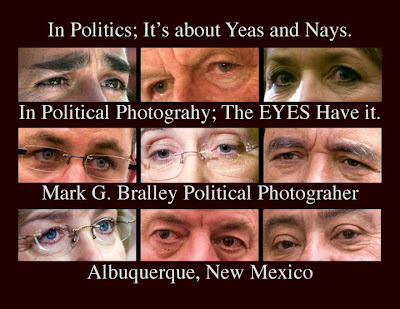 In amassing photos of various candidates and politicians eyes, I’ve never gotten such a close up shot of Chávez. Most of the pictures I took for this project were taken over the shoulder of other journalist from a distance of no less than five feet.
In amassing photos of various candidates and politicians eyes, I’ve never gotten such a close up shot of Chávez. Most of the pictures I took for this project were taken over the shoulder of other journalist from a distance of no less than five feet.Note: A Joe Monahan type free lunch contest to the first person that accurately identifies all nine. Contest not open to Joe Monahan, or anyone associated with any of those pictured. They were all taken during the past few years on New Mexico’s political scene. Yes, there is a trick embedded in the question.

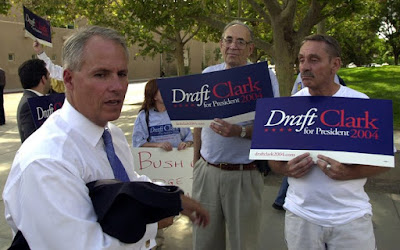 I have been close to Chávez on two occasions, both at the University of New Mexico. During the 2003 Democratic Party’s first debate by declared candidates for their party's presidential nomination at Popejoy Hall, Chávez confronted a number of Gen. Wesley Clark supporters. I moved in close to Chávez to juxtapose him next to the demonstrators. He noticed a camera and started to pose at which time I lowered my camera. He recognized me, disengaged from the group mid sentence, walked away and said, ”It’s the guy.” This was the closest that I have moved on Chávez. He has moved closer to me.
I have been close to Chávez on two occasions, both at the University of New Mexico. During the 2003 Democratic Party’s first debate by declared candidates for their party's presidential nomination at Popejoy Hall, Chávez confronted a number of Gen. Wesley Clark supporters. I moved in close to Chávez to juxtapose him next to the demonstrators. He noticed a camera and started to pose at which time I lowered my camera. He recognized me, disengaged from the group mid sentence, walked away and said, ”It’s the guy.” This was the closest that I have moved on Chávez. He has moved closer to me.The second event, Aug. 21, 2007, Chávez and University President David Schmidly, announced that ABQ Ride busses would provide students free rides to campus. After the mayor and Schmidly took questions from a KUNM Reporter, Chávez walked by me very closely. There was adequate room between the bus and me, however he walked into my personal space. I did not move my feet, but as my auto focus lens slammed to the minimum focus distance I leaned backwards to keep him in focus and take his picture.
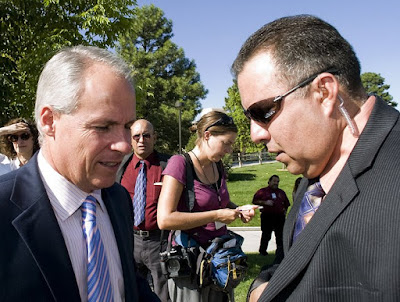 Chávez spoke to Sanchez, right, telling him, “This guy’s problems…” and it was the first time I heard that “He is afraid of you,” according to both Sanchez and Spokeswoman James. I was not allowed on the bus with the other members of the media.
Chávez spoke to Sanchez, right, telling him, “This guy’s problems…” and it was the first time I heard that “He is afraid of you,” according to both Sanchez and Spokeswoman James. I was not allowed on the bus with the other members of the media.Sanchez told me that he downloaded the similar picture that appeared in the posting because he liked it so much and has it at his desk. I was closer to Sanchez than Chávez and he had no problem.
I tend not to crowd Chávez for two other reasons: he's not very tall; if I get too close, my camera angle will be pointed slightly downward extenuating his height, and because he has bald spots, it's just not kind.
According to the Nikon website the long lens I use as my standard telephoto is the AF Zoom-NIKKOR 80-200mm f/2.8D ED. Its minimum focus distance is 4.9 ft. (1.5m) and its dimensions are 3.4x7.4 in. (diameter x length).
My standard wide angle to short telephoto zoom lens I use is the AF-S DX Zoom-NIKKOR 17-55mm f/2.8G IF-ED. Its minimum focus distance is 1.18 ft. (.36m) or a little more than 14 inches and its dimensions are 3.4x4.4in. (diameter x length).
Maybe I’ll just have to bring my 800mm lens to the next outdoor event and stand off beyond its 26-foot minimum focus distance to make a working portrait of Chávez. Then he couldn’t claim that I was up in his face and still get the wrinkles around his eyes, his receding hairline and show him as he really is.
Chávez has displayed no problems during events when he is with other more senior politicians. He only asserts himself when he is in control. I have been present without issue with major politicians including: President Barack Obama and when he was both his Party’s nominee and earlier as a candidate for nomination,
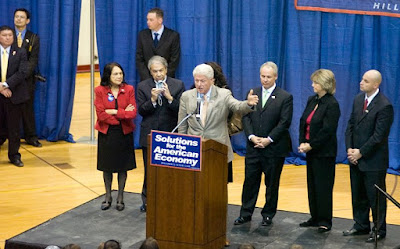 with former President Bill Clinton, Sen. Hilary Clinton,
with former President Bill Clinton, Sen. Hilary Clinton, with Speaker of the House Nancy Pelosi, and Los Angeles Mayor Antonio Villaraigosa, in white shirt, at a Patricia Madrid for Congress rally,
with Speaker of the House Nancy Pelosi, and Los Angeles Mayor Antonio Villaraigosa, in white shirt, at a Patricia Madrid for Congress rally,Denver Mayor Fredrico Pena,
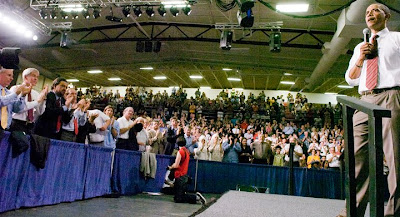 with Gov. Bill Richardson, and the New Mexico Democratic Dem. Congressional delegation.
with Gov. Bill Richardson, and the New Mexico Democratic Dem. Congressional delegation.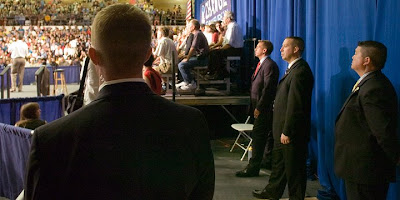 Detective Holms, right, said nothing nor made any kind of movement or gesture,
Detective Holms, right, said nothing nor made any kind of movement or gesture, even when at one point I sat at Chávez' feet,
even when at one point I sat at Chávez' feet,and at New Mexico Democratic Party gatherings.
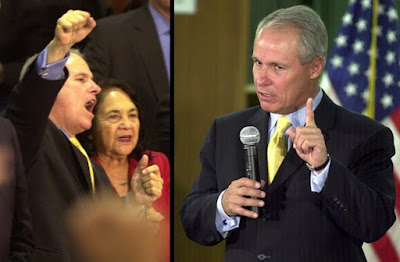 Chávez, above left, cheerleading Sen. Hilary Clinton at her Saturday Feb. 2, 2008 rally; right, he introduced Obama Aug. 18, at the main public library.
Chávez, above left, cheerleading Sen. Hilary Clinton at her Saturday Feb. 2, 2008 rally; right, he introduced Obama Aug. 18, at the main public library.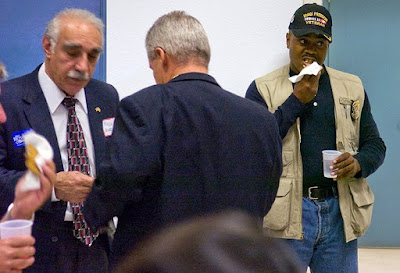 Chávez' security detail has never expressed any fear about me.
Chávez' security detail has never expressed any fear about me.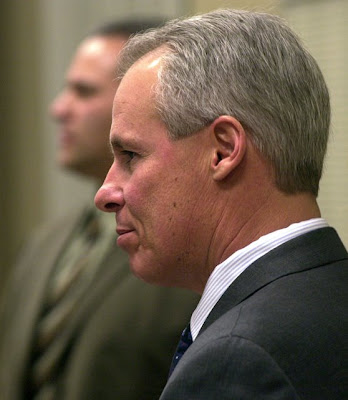 It is not uncommon for an officer providing security to place themself between the threat and the protected person. However, seldom is that the case ever since I first heard Chávez say that I was a “trouble maker.”
It is not uncommon for an officer providing security to place themself between the threat and the protected person. However, seldom is that the case ever since I first heard Chávez say that I was a “trouble maker.”So the reasonable question is why does he feel more secure amongst the luminaries? Could it be that because the major politicos don’t know me or worry about coverage from anyone, that he won’t embarrass them by making a scene? If Chávez doesn’t feel his security detail is capable of assuaging his fears, maybe it’s time to get bigger individuals who engender greater confidence.

As for the Albuquerque Public Schools’ personnel and in particular Albuquerque High School employees, they were unwittingly taken in by the slander of the mayor’s group that we were not media.
Principal McCorkle was gracious, even if he was unaware of what impropriety was being done under his authority.
AHS Activity Director Gonzales and APS Police Officer Schaefer’s approach of ordering us to leave before determining facts from their own independent investigations makes them rubes; simple tools of the mayor.
Schaefer’s fellow APS officer, whose identity I was unable to establish, appropriately covered him. She clearly was uncomfortable by the unnecessarily confrontational interaction Schaefer engaged in. She left and went about her business as soon as possible after we were escorted to the office. Schaefer never even asked us our names.
APS security and police personnel failed to comply with policy, especially, “With this authority comes constitutional and statutory responsibilities and limitations.” Schaefer’s move was not based on all the available facts. The selective enforcement and excuse that we did not have a visitor’s pass fails because there was not a single visitor’s pass displayed by anyone else at the press conference.
School Police AuthorityAPS Security Aide McGee was inside my personal space as she escorted us to the parking lot. She seemed to be trying to step on my heels except when she was distracted by two incidents involving students.
School Police officers are certified and commissioned law enforcement officers with comparable police authority to the Albuquerque Police Department’s officers and the Bernalillo County Sheriff’s Department’s deputies. As such, they have the authority to make arrests. With this authority comes constitutional and statutory responsibilities and limitations. The decision to arrest lies solely with the officer who will or will not make the arrest based upon the facts known to the officer at the time. Generally, a police officer cannot arrest for a violation of a misdemeanor which does not occur in his/her presence.
The aide had no sense of personal safety as she put herself in a position of possible attack. It wouldn’t happen with me, but I can envision some high school ruffian being ordered around by her gruff mannerisms turning on her and cleaning her clock.
Armenta shuts down communications by requiring APS employees to direct all questions to her and then, though she instructs them to say she is crafting a response, doesn’t.
 Chávez has reason to be concerned with my photography. It’s not particular to him, but by the way I photograph politicians, I zero in on them and any self perceived flaws maybe enhanced by my concentration.
Chávez has reason to be concerned with my photography. It’s not particular to him, but by the way I photograph politicians, I zero in on them and any self perceived flaws maybe enhanced by my concentration.As I have readily admitted, Chávez is not my favorite politician. He intentionally tried to damage my police career by moving me from the video production unit at the police academy and assigning me to a civilian entry-level records clerk job.
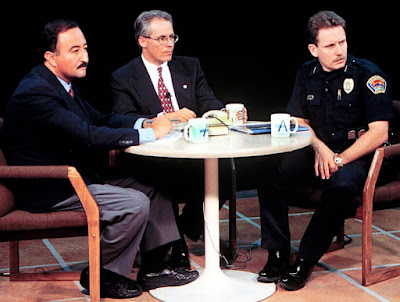 He later was very angry when, as part of the police union’s efforts, I successfully advocated defeating the quarter percent “Public Safety tax.” Here he is with then City Councillor Steve Gallegos and Chief Joe Polisar when Chávez called upon citizens to vote for the tax on his GOV-TV Governmemtn Cable Access Channel.
He later was very angry when, as part of the police union’s efforts, I successfully advocated defeating the quarter percent “Public Safety tax.” Here he is with then City Councillor Steve Gallegos and Chief Joe Polisar when Chávez called upon citizens to vote for the tax on his GOV-TV Governmemtn Cable Access Channel. I also did some investigative work for one of the groups that brought charges against Chávez in the ABQPAC Ethics Board hearings. He is seen here with his then wife, Margaret Aragón de Chávez and her brother Robert Aragón.
I also did some investigative work for one of the groups that brought charges against Chávez in the ABQPAC Ethics Board hearings. He is seen here with his then wife, Margaret Aragón de Chávez and her brother Robert Aragón.They are attending a City Council meeting that sent the ethics charges to the City's internal Ethics Board rather than to the District Attorney.
ABQPAC was formed in part to fund travel expenses for Aragón de Chávez to travel with the mayor on business trips.
If one reviews my published photographs of Chávez, however one would be hard pressed to say that I haven’t fairly captured the wide range of expression and emotions he displays.

Note: A correction was made in the identification of the above photograph. I misidentified Margaret Aragón de Chávez' brother, former State Senator Robert Aragón, as John Wertheim, who would become State Democratic Party Chairman. My apologies, thanks to Michelle Meaders for catching the error and current State Democratic Party Chairman Brian Colón for the proper identification.
4 comments:
I always learn a lot from your articles. However, there is a problem with the caption under the last picture:
"He is seen here with his then wife, Margaret Aragon de Chávez and John Wertheim, who would become State Democratic Party Chairman."
I think that's Bobby Aragon, not John Wertheim. He ran for Bern. County Dem. Chair last time, and lost to Ana Canales.
This needs to be brought up at City Council. There needs to be a measure passed where electronic media can attain a seasonal/yearly press pass so as not to be dependent on each events press person's philosophy on the media.
While I can see the past history between Chavez and you has a hand in this you still should be allowed access as long as there is no threats to the mayor.
The ACLU should take a look at this and get involved.
Nothing this mayor does is a surprise to me. Thanks for a very insightful story.
Post a Comment